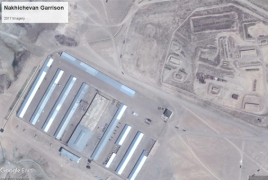Azeri militarization of Nakhichevan and Karabakh conflict: bellingcat October 5, 2017 - 15:26 AMT PanARMENIAN.Net - As a result of heavy military build-up by Azerbaijan in Nakhichevan, Armenia appears to be moving towards a change in its strategy with dealing with its neighbor, bellingcat said in a fresh extensive analysis of the current situation in the region and how it could evolve in the near future. "Additionally, the four-day war has caused Armenia to shift its perception of the role of the West and Russia–who were reluctant to restrain Azerbaijan’s actions in the brief war–in the process of seeking resolution in the ongoing conflict between the two Caucasian nations," bellingcat says. "Azerbaijan’s television broadcasts and official videos on Nakhichevan’s military preparedness have shed more light on developments in the exclave. Along with war games with Turkey in the exclave, this renewed show of might indicates an Azerbaijani military rejuvenation. Google Earth imagery of Nakhichevan reveals a steady military build-up since 2012, in contrast to the minimum fire power indicated by Google Earth history prior to that year. Also significant is the Nakhichevan Separate Combined Arms Army established by President Aliyev in 2013. In the light of this build-up, Azerbaijan’s shift in policy, and the April 2016 4-day war, a resumption of violence on the Armenia-Nakhichevan border is a real possibility in the case of war." Even without Nakhichevan entering a future conflict, the exclave will play a major role in a future war by potentially diverting Armenian troops from the Karabagh front, a tactic that would favour Azerbaijan, the article says. "An exclave that previously had no role in any possible future hostilities is now becoming part of the extended battlefield. While the major powers have used a soft approach to contain the battle space to Nagorno-Karabakh, the military build-up in Nakhichevan has apparently broken this unspoken understanding," it says. "Theoretically, the exclave’s potential role in a renewed conflict could tip the balance in Azerbaijan’s favour. However, this potential advantage needs to be weighed against the isolation of the exclave, which provides Armenia with an advantage. A change has also been noted in Azerbaijan’s policy towards Nagorno-Karabakh, leading to a shift away from the negotiation process towards settling the conflict through military means. Azerbaijan’s attack on regions within Nagorno Karabakh itself (which fall under self-determination clauses) in the 4-day war has left many wondering why the superpowers, especially Russia, allowed Azerbaijan to attack regions other than the disputed territories (which are marked for return under the principles written for a negotiated settlement)." "The reality on the ground has shifted from when many of the negotiating principles were drawn up and, with the larger powers playing their own game, it seems their lack of committed to the peace process will leave Armenia and Azerbaijan to battle it out themselves," the article concludes. The EU does not intend to conduct military exercises with Armenia, Lead Spokesperson for EU Foreign Affairs and Security Policy Peter Stano says. A telephone conversation between Putin and Pashinyan before the CSTO summit is not planned, Peskov says. London’s Armenian community has been left feeling “under attack” after the city’s Genocide monument was vandalised. The United States believes there should be an international mission to provide transparency. Partner news |